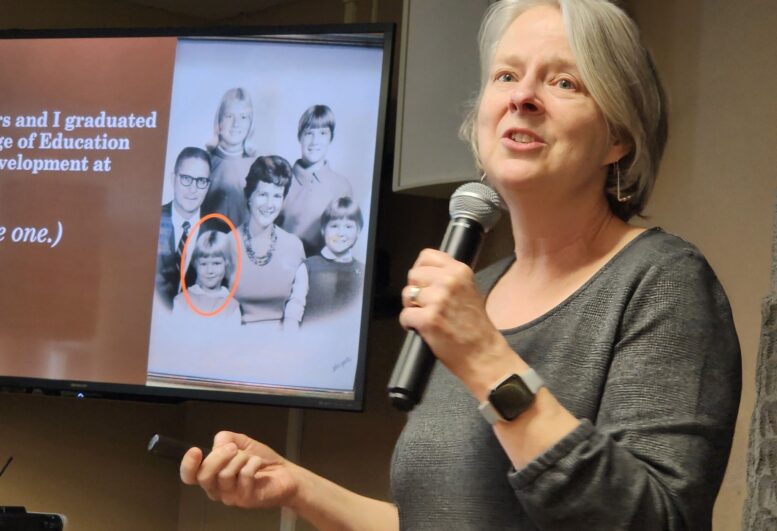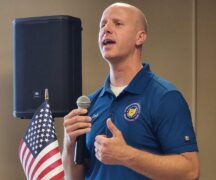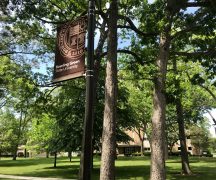By JAN McLAUGHLIN
BG Independent News
School superintendents used to call Dawn Shinew when they had tricky spots to fill, like a math teacher. They didn’t realize at the time that those would become the good old days, when schools had their pick of several teachers for each opening.
“Now they need help finding second grade teachers,” an indicator of the nationwide teacher shortage, said Shinew, dean of the BGSU College of Education and Human Development.
Preparing new educators for the classroom is one of the most important jobs for institutions of higher learning, she said as she spoke to the Bowling Green Kiwanis Club Thursday, during Inspirational Educators Month.
“The challenges are real,” Shinew said. “The teacher shortage is going to affect all of us.”
The shortages are the most severe in sciences and secondary languages, and for students with special needs. It has become a national crisis, she said.
For Shinew, becoming something other than a teacher would have betrayed her roots.
Both of her grandmothers were among the first class of 304 students when Bowling Green Normal School (later to become BGSU) was founded in 1910 to train teachers. Both graduated and went on to teach in one-room schoolhouses.
One of her grandmas secretly eloped, since female teachers were not permitted to be married. She had to fess up later when she became pregnant, Shinew said. Her father was also a teacher.
Teaching, she said, is part of her lineage.
“For me, this is not just a job. It is part of my blood.”
When Shinew graduated from BGSU, she took a job as a middle school teacher in California. Her first day on the job, she overheard students talking about her, referring to her as the “white girl.”
Shinew took the opportunity to broaden her world, and learn about people different than those she grew up with in Northwest Ohio.
“I learned a lot more from my students than what they learned from me,” she said.
Her students were fascinated by the photos from back home that Shinew received from her dad. The California students had never seen a combine working a field, stalks of corn, or acres of wheat.
Thirteen new teachers started that same year as Shinew – 11 didn’t come back for the next year. She wondered what was different that made her want to return.
“You need to know the students you are teaching,” she said. “You have to connect with them.”
Now, Shinew is making those connections at BGSU, turning students into teachers.
Not everyone is cut out to be a teacher, she said.
“We get people who think they want to be a teacher,” someone who tells her, “I really love kids.”
But there is a difference between loving kids and being able to teach a subject to 32 children with different needs, while ensuring they get along in the classroom.
BGSU has moved up its classroom experience for future teachers to earlier in their college years – rather than waiting until the last semester of student teaching to find out that the teacher in training isn’t cut out for the job.
“I want them to know if it fits them,” Shinew said. “While we desperately need teachers, I want them to want to be in the classroom.”
Bowling Green City Schools and other districts help out by using prospective teachers to address learning gaps through tutoring programs. And “camps” are run on teaching subjects like English, science and math.
“I still think learning should be fun,” Shinew said.
To help students become comfortable as teachers in front of a classroom of kids, virtual classrooms are used to get them accustomed to student interaction.
“We want our students to be as prepared as they can before they walk into a classroom,” she said.
Shinew reflected on the two elementary educators who really made a difference in her life.
The first was Pat McGinnis, her principal, who talked with Shinew after she punched a boy for making fun of her sister. Rather than telling Shinew she was wrong in hitting the boy, McGinnis asked why she hit the boy. Shinew explained, and McGinnis talked with her about better ways to handle the situation.
“I learned the power of asking kids a question first,” Shinew said.
The other was her second grade teacher, Mrs. Rhodes, who told the class that chocolate milk came from brown cows. “She taught me that learning should always be fun. She made sure we all knew we could be successful.”
She asked her audience to show their appreciation of those in the teaching profession.
“More than ever before, teachers need our support,” she said. “They will make a difference in the next generation for us.”





